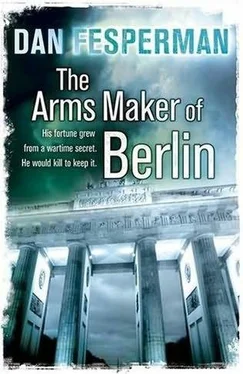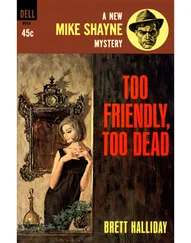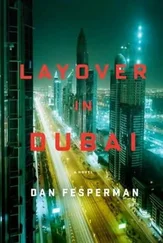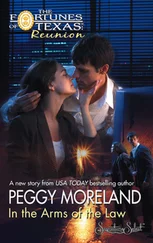Dan Fesperman - The Arms Maker of Berlin
Здесь есть возможность читать онлайн «Dan Fesperman - The Arms Maker of Berlin» весь текст электронной книги совершенно бесплатно (целиком полную версию без сокращений). В некоторых случаях можно слушать аудио, скачать через торрент в формате fb2 и присутствует краткое содержание. Жанр: Триллер, на английском языке. Описание произведения, (предисловие) а так же отзывы посетителей доступны на портале библиотеки ЛибКат.
- Название:The Arms Maker of Berlin
- Автор:
- Жанр:
- Год:неизвестен
- ISBN:нет данных
- Рейтинг книги:5 / 5. Голосов: 1
-
Избранное:Добавить в избранное
- Отзывы:
-
Ваша оценка:
- 100
- 1
- 2
- 3
- 4
- 5
The Arms Maker of Berlin: краткое содержание, описание и аннотация
Предлагаем к чтению аннотацию, описание, краткое содержание или предисловие (зависит от того, что написал сам автор книги «The Arms Maker of Berlin»). Если вы не нашли необходимую информацию о книге — напишите в комментариях, мы постараемся отыскать её.
The Arms Maker of Berlin — читать онлайн бесплатно полную книгу (весь текст) целиком
Ниже представлен текст книги, разбитый по страницам. Система сохранения места последней прочитанной страницы, позволяет с удобством читать онлайн бесплатно книгу «The Arms Maker of Berlin», без необходимости каждый раз заново искать на чём Вы остановились. Поставьте закладку, и сможете в любой момент перейти на страницу, на которой закончили чтение.
Интервал:
Закладка:
“I also want to thank Liesl Folkerts for making sure that Jörg had safe passage through the train station to his uncle’s house. Believe me, if you knew how many policemen were there that day, checking papers, you would realize this was no simple feat.”
Kurt swelled with pride for her, and was more convinced than ever that he had done the right thing by coming here.
“Now,” Hartert said, “shall we all introduce ourselves?”
There were nine others-four women and five men. Kurt stood first. He spoke his name loudly and clearly, wondering how many of them realized the significance-and the inherent risk-of the presence of a Bauer. Each of the others then stood in turn, announcing a name and then sitting back down. Except Dieter Büssler, of course, who felt compelled to give a short speech.
“We all know why we are here, and I hope that everyone noticed on the way in that to get to this church from Dr. Niemoller’s house, you have to pass among the tombstones of the dead.” That meant Dieter had also taken the coward’s path through the cemetery. Kurt suppressed a smile. “They are Germany’s fallen. Some from disease and from old age, some from the fields of Verdun, and some from the ruins of Stalingrad. We must show that we are worthy of their sacrifice as we prepare to walk our own valley of death in support of our beliefs.”
Perhaps Dieter expected applause, because he waited a moment too long before sitting. Instead, there was an awkward cough. No one seemed to know what to say next.
Then Liesl rose.
“Those are admirable sentiments, Dieter. Of course, we are also hoping most fondly that not a single one of us will lose his life in this venture.” Relieved laughter. “Nor should that be even a part of our intent. We do not seek martyrdom, because surely we do this for the living, and, for some of us, also for the glory of God. It is our enemies who celebrate death, not us. Why act for our future unless we can also hope to have a productive role in it?”
Dieter looked suitably chastened, so Liesl softened the blow.
“But we do thank you for the passion of your words and the nobility of your intent.”
She then smiled sympathetically at Dieter, warmly enough to almost make Kurt wish he had delivered the blowhard soliloquy.
With equilibrium restored, Falk Harnack announced to general approval that two of the original members of the White Rose in Munich had promised that they would soon travel to Berlin to offer support.
“Dr. Bonhoeffer has endorsed this idea as well,” he said, “although, as you know, it is best if he doesn’t appear at gatherings such as this, due to the ban on his teaching, and also because he is so often under surveillance.”
Other White Rose cells, he said, had sprung to life in Hamburg, Cologne, Stuttgart, Freiberg, and Saarbrücken. Batches of pamphlets had even crossed into Austria and been seen on the streets of Vienna. Then, to set the tone for the job ahead, he read aloud each of the four pamphlets that had been published to date.
Even in his buoyant mood, Kurt went a little weak in the knees as he listened to the damning words. He found himself wondering anew if he had searched thoroughly enough for intruders in the loft.
Helmut Hartert stood again.
“There are some here who wish to distribute these pamphlets that Jörg has brought from Munich, and that is fine. But I also believe strongly that we should write our own. One concern that I have expressed to Jörg and Falk is that the anti-military tone will not go over so well in a city where you see a wounded veteran or a war widow almost every time you board the S-Bahn. We must strike the proper tone for our own city, with help and contributions from all of you, of course.
“In the meantime, I have secured a small printing press. All that remains now, besides the writing, is the procurement of supplies. Ink and writing paper are our greatest needs, and we urgently need volunteers to provide them. The most difficult of these tasks will be the acquisition of paper. Not only due to rationing but because the authorities have become very suspicious of anyone seeking large amounts of paper who isn’t associated with an officially sanctioned publishing concern. So, then, any takers?”
Liesl glanced back at him, and Kurt knew exactly what she was thinking. While they had been seeing each other the previous year, he had acquired paper for her by stealing it from a secretary’s desk at his father’s office. He had boasted at the time that there was plenty more where that came from, and now she was counting on him to rise to the occasion.
“I can do it,” he blurted. “I can get the paper.”
The others looked at him in surprise. He felt burdened almost the second the words left his mouth, but there was no taking them back.
The meeting ended not long afterward. He experienced a brief feeling of panic as the door opened, half expecting a blast of bright lights and a loud voice hailing them over a megaphone, announcing that they were all under arrest.
Instead, night had fallen. All was quiet. No one lurked on the corners, in the churchyard, or even among the tombstones.
Liesl took his hand before he had a chance to speak, and they strolled off toward the entrance to the Dahlem-Dorf U-Bahn station.
“Would you like to come over to my house, to have dinner with my parents and me?”
“Yes, I’d like that very much.”
He would have to come up with a cover story for his parents, of course, but he supposed that was going to be a fact of life from here on out. His father must never know.
“Welcome to your new life as an adult,” she said. “I am so glad to see you have grown into it. And as happy as I am for our organization, I am even happier for myself. I’ve missed you.”
It was about then that Kurt noticed the stout young woman walking just behind them. Up to now she hadn’t made a sound. Kurt had already forgotten her name. Liesl turned and introduced her.
“Kurt, this is Hannelore Nierendorf. Hannelore, please meet Kurt Bauer.”
She reminded him of someone, but he didn’t realize who until he noticed the sign for the U-Bahn looming just ahead. The thought of the subway tunnel jogged his memory. Hannelore was a dead ringer for “Frau Knoterich,” the cartoon image of a plump, gossipy chatterbox that had begun appearing on subway propaganda posters, which inveighed against rumormongering. Her costar was the skinny “Herr Bramsig,” a doom-and-gloom pessimist.
Hannelore offered a muted “Guten Abend” and a cold stare. Either she wasn’t pleased to meet him or this was the expression she showed everyone, but Liesl seemed oblivious to either possibility.
“She will also be joining us for dinner, but of course we will not be able to discuss this evening’s matters around my parents.”
Well, that was too bad. He had hoped to have Liesl all to himself once the meal was over. But there would be plenty of time for that in the days to come, and with that thought he felt restored, renewed. Life, for all its new risks, again seemed full of possibility. Or it did until Hannelore brought him back to earth with a gruff question.
“Where do you think you will find paper? It won’t be easy, you know. You can’t just go out and buy it, even if you have enough coupons.”
“My father’s offices. That’s where I’ll start.”
“Remember, he’s a Bauer,” Liesl offered. “The armaments family.”
“Ah, then no wonder you have joined us, with so much to atone for.”
“That’s not what I meant,” Liesl said. “It’s his father’s business, not Kurt’s.”
The admonishment temporarily silenced Frau Knoterich. Kurt decided he could handle Hannelore’s presence just fine as long as Liesl was around.
Читать дальшеИнтервал:
Закладка:
Похожие книги на «The Arms Maker of Berlin»
Представляем Вашему вниманию похожие книги на «The Arms Maker of Berlin» списком для выбора. Мы отобрали схожую по названию и смыслу литературу в надежде предоставить читателям больше вариантов отыскать новые, интересные, ещё непрочитанные произведения.
Обсуждение, отзывы о книге «The Arms Maker of Berlin» и просто собственные мнения читателей. Оставьте ваши комментарии, напишите, что Вы думаете о произведении, его смысле или главных героях. Укажите что конкретно понравилось, а что нет, и почему Вы так считаете.












